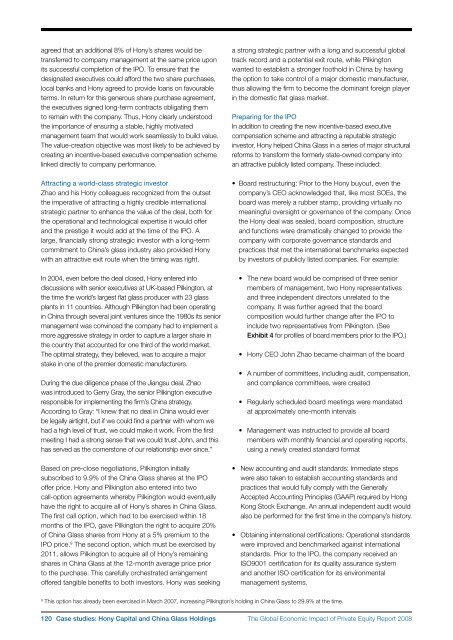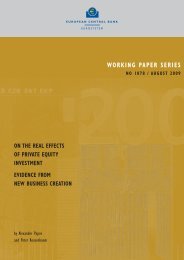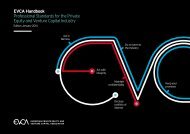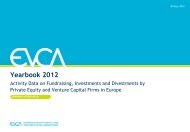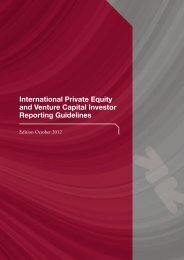agreed that an additional 8% <strong>of</strong> Hony’s shares would betransferred to company management at the same price uponits successful completion <strong>of</strong> the IPO. To ensure that thedesignated executives could afford the two share purchases,local banks and Hony agreed to provide loans on favourableterms. In return for this generous share purchase agreement,the executives signed long‐term contracts obligating themto remain with the company. Thus, Hony clearly understoodthe importance <strong>of</strong> ensuring a stable, highly motivatedmanagement team that would work seamlessly to build value.<strong>The</strong> value‐creation objective was most likely to be achieved bycreating an incentive‐based executive compensation schemelinked directly to company performance.Attracting a world-class strategic investorZhao and his Hony colleagues recognized from the outsetthe imperative <strong>of</strong> attracting a highly credible internationalstrategic partner to enhance the value <strong>of</strong> the deal, both forthe operational and technological expertise it would <strong>of</strong>ferand the prestige it would add at the time <strong>of</strong> the IPO. Alarge, financially strong strategic investor with a long‐termcommitment to China’s glass industry also provided Honywith an attractive exit route when the timing was right.In 2004, even before the deal closed, Hony entered intodiscussions with senior executives at UK‐based Pilkington, atthe time the world’s largest flat glass producer with 23 glassplants in 11 countries. Although Pilkington had been operatingin China through several joint ventures since the 1980s its seniormanagement was convinced the company had to implement amore aggressive strategy in order to capture a larger share inthe country that accounted for one third <strong>of</strong> the world market.<strong>The</strong> optimal strategy, they believed, was to acquire a majorstake in one <strong>of</strong> the premier domestic manufacturers.During the due diligence phase <strong>of</strong> the Jiangsu deal, Zhaowas introduced to Gerry Gray, the senior Pilkington executiveresponsible for implementing the firm’s China strategy.According to Gray: “I knew that no deal in China would everbe legally airtight, but if we could find a partner with whom wehad a high level <strong>of</strong> trust, we could make it work. From the firstmeeting I had a strong sense that we could trust John, and thishas served as the cornerstone <strong>of</strong> our relationship ever since.”Based on pre‐close negotiations, Pilkington initiallysubscribed to 9.9% <strong>of</strong> the China Glass shares at the IPO<strong>of</strong>fer price. Hony and Pilkington also entered into twocall‐option agreements whereby Pilkington would eventuallyhave the right to acquire all <strong>of</strong> Hony’s shares in China Glass.<strong>The</strong> first call option, which had to be exercised within 18months <strong>of</strong> the IPO, gave Pilkington the right to acquire 20%<strong>of</strong> China Glass shares from Hony at a 5% premium to theIPO price. 9 <strong>The</strong> second option, which must be exercised by2011, allows Pilkington to acquire all <strong>of</strong> Hony’s remainingshares in China Glass at the 12‐month average price priorto the purchase. This carefully orchestrated arrangement<strong>of</strong>fered tangible benefits to both investors. Hony was seekinga strong strategic partner with a long and successful globaltrack record and a potential exit route, while Pilkingtonwanted to establish a stronger foothold in China by havingthe option to take control <strong>of</strong> a major domestic manufacturer,thus allowing the firm to become the dominant foreign playerin the domestic flat glass market.Preparing for the IPOIn addition to creating the new incentive‐based executivecompensation scheme and attracting a reputable strategicinvestor, Hony helped China Glass in a series <strong>of</strong> major structuralreforms to transform the formerly state‐owned company intoan attractive publicly listed company. <strong>The</strong>se included:• Board restructuring: Prior to the Hony buyout, even thecompany’s CEO acknowledged that, like most SOEs, theboard was merely a rubber stamp, providing virtually nomeaningful oversight or governance <strong>of</strong> the company. Oncethe Hony deal was sealed, board composition, structureand functions were dramatically changed to provide thecompany with corporate governance standards andpractices that met the international benchmarks expectedby investors <strong>of</strong> publicly listed companies. For example:• <strong>The</strong> new board would be comprised <strong>of</strong> three seniormembers <strong>of</strong> management, two Hony representativesand three independent directors unrelated to thecompany. It was further agreed that the boardcomposition would further change after the IPO toinclude two representatives from Pilkington. (SeeExhibit 4 for pr<strong>of</strong>iles <strong>of</strong> board members prior to the IPO.)• Hony CEO John Zhao became chairman <strong>of</strong> the board• A number <strong>of</strong> committees, including audit, compensation,and compliance committees, were created• Regularly scheduled board meetings were mandatedat approximately one-month intervals• Management was instructed to provide all boardmembers with monthly financial and operating reports,using a newly created standard format• New accounting and audit standards: Immediate stepswere also taken to establish accounting standards andpractices that would fully comply with the GenerallyAccepted Accounting Principles (GAAP) required by HongKong Stock Exchange. An annual independent audit wouldalso be performed for the first time in the company’s history.• Obtaining international certifications: Operational standardswere improved and benchmarked against internationalstandards. Prior to the IPO, the company received anISO9001 certification for its quality assurance systemand another ISO certification for its environmentalmanagement systems.9This option has already been exercised in March 2007, increasing Pilkington’s holding in China Glass to 29.9% at the time.120 Case studies: Hony Capital and China Glass Holdings<strong>The</strong> <strong>Global</strong> <strong>Economic</strong> <strong>Impact</strong> <strong>of</strong> <strong>Private</strong> <strong>Equity</strong> <strong>Report</strong> <strong>2008</strong>
Executing the IPOEach <strong>of</strong> the initiatives taken in the months immediately beforeand after Hony closed the transaction at the end <strong>of</strong> 2004were building blocks for creating a more pr<strong>of</strong>essionallymanaged, internationally competitive company. <strong>The</strong> ultimateobjective <strong>of</strong> these reforms was to establish credibility withprospective investors and regulators, which would positionthe company to gain continuous access to diversifiedsources <strong>of</strong> capital and a platform to expand – a necessityfor China Glass’s long‐term growth and competitiveness.Moreover, a successful IPO would eliminate the company’sfinancial dependence on the State, and place it squarelyin the ranks <strong>of</strong> private companies that are continuouslysubjected to the discipline <strong>of</strong> market forces. In other words,the future availability and cost <strong>of</strong> capital would be a function<strong>of</strong> market perceptions <strong>of</strong> company performance rather thangovernment considerations.As the controlling shareholder, Hony took charge <strong>of</strong> guidingthe company through the entire underwriting process,selecting the investment bank and financial advisors,overseeing the preparation <strong>of</strong> the prospectus, registeringthe <strong>of</strong>fering with the Hong Kong authorities, orchestratingand running the road show and establishing the timing andpricing <strong>of</strong> the <strong>of</strong>fering. Zhou believed that “Hony’s hands‐oninvolvement at every step <strong>of</strong> the process was critical to thesuccessful outcome <strong>of</strong> the IPO”.In June 2005, only seven months after Hony closed thebuyout transaction, China Glass Holdings Ltd issued 90 millionnew shares on the HKSE, raising US$25 million <strong>of</strong> capital, thebulk <strong>of</strong> which was applied to meet the previously agreedstrategic objective <strong>of</strong> rapidly expanding production capacity.As one measure <strong>of</strong> how far the company had come in a shortperiod <strong>of</strong> time, the <strong>of</strong>fering was eight times over-subscribedeven though the IPO price represented a 12.8 P/E ratio, wellabove the prevailing industry average <strong>of</strong> about 8.0. Post‐IPO,Hony continued to control the company, albeit with a dilutedequity stake now <strong>of</strong> 62.56%; management held 12.44%,Pilkington held 9.9% and the remaining 15.1% was in thehands <strong>of</strong> the public shareholders.Creating a market leader: executing anacquisition‐led growth strategyFrom the very beginning <strong>of</strong> their strategic discussions,Hony and China Glass management shared theunderstanding that a successful listing would be only thebeginning <strong>of</strong> China Glass’s fight to become China’s premierflat glass manufacturer. Pre‐IPO, ranked tenth in scaleamong domestic manufacturers, China Glass was in atenuous position facing the inevitable onslaught <strong>of</strong> industryconsolidation. “Either we will be acquired by one <strong>of</strong> our largercompetitors, or we would become an acquirer,” explainedZhou. Post‐IPO, armed with the international brandrecognition and the permanent source <strong>of</strong> diversified capitalafforded by the listing, China Glass was ready to be the latter.In February 2006, only eight months after China Glass’s HKSElisting, the company announced its intention to undertake amajor acquisition on an unprecedented scale in the history<strong>of</strong> the Chinese glass industry. <strong>The</strong> transaction involved theacquisition <strong>of</strong> seven glass manufacturers with a combineddaily capacity <strong>of</strong> 4,780 tons, more than three times ChinaGlass’s own capacity. <strong>The</strong> expansion took the companyfrom three production lines to 14, making it China’s largestlisted flat glass producer. With one stroke, not only did thisacquisition extend China Glass’s footprint to all theeconomically important regions <strong>of</strong> the country, but it alsoresulted in a significantly more diversified and technicallyadvanced product portfolio, containing varieties such aslow‐e glass, super‐thin glass, silicon glass and solar glass.Hony led China Glass through every stage <strong>of</strong> thetransaction, serving as both the strategic mastermind andthe execution specialist. <strong>The</strong> Hony team played a criticalrole in selecting the acquisition targets, designing a feasiblefinancing strategy, mobilizing the required capital and guidingthe company through a web <strong>of</strong> technical complexities.When the entire transaction was finally completely inmid-2007, China Glass had established itself as the leadingChinese glass manufacturer. When asked about Hony’srole in the acquisition strategy, Zhou said without hesitation:“Without Hony, we could never have dreamed <strong>of</strong> takingChina Glass where it is today.” (See Exhibit 5 and Exhibit 6for a summary <strong>of</strong> recent acquisitions by China Glass, and thecompany’s post‐acquisition capacity and product portfolioinformation respectively.)Expanding access to international capital marketsIn July 2007, two years after the IPO, a much larger andcompletely restructured China Glass again demonstratedits ability to access capital from international sources oncompetitive terms. Returning to the public securities market,the company successfully issued a US$100 million ($95.8million net after fees and commissions), five‐year, 9.625%US‐dollar denominated note in Singapore. <strong>The</strong> bulk <strong>of</strong> theproceeds from this bond issue were used to strengthen thecompany’s balance sheet by refinancing and extending thematurities <strong>of</strong> existing debt obligations. Hony was againinstrumental in marketing and placing this <strong>of</strong>fering.Employment practicesThrough the years, Hony never wavered from one <strong>of</strong> thefundamental tenets <strong>of</strong> its investment philosophy: buyoutsuccess in China depends on the retention <strong>of</strong> keymanagement personnel. Zhao explained: “We will only makean investment when we are convinced there is a completealignment <strong>of</strong> interests with senior management about whatneeds to be done post‐investment to grow the company.Consistent with this approach is our conviction that we willnot do a deal that requires a change <strong>of</strong> management.” Inthe China Glass case, as <strong>of</strong> mid‐2007 there had been nomanagement turnover, no abnormal lay<strong>of</strong>fs associated withthe buyout and employee wages and benefits had beenstructured to ensure competitiveness with industry standards.<strong>The</strong> <strong>Global</strong> <strong>Economic</strong> <strong>Impact</strong> <strong>of</strong> <strong>Private</strong> <strong>Equity</strong> <strong>Report</strong> <strong>2008</strong> Case studies: Hony Capital and China Glass Holdings 121
- Page 2 and 3:
The Globalization of Alternative In
- Page 5:
ContributorsCo-editorsAnuradha Guru
- Page 9 and 10:
PrefaceKevin SteinbergChief Operati
- Page 11 and 12:
Letter on behalf of the Advisory Bo
- Page 13 and 14:
Executive summaryJosh lernerHarvard
- Page 15 and 16:
• Private equity-backed companies
- Page 17 and 18:
C. Indian casesThe two India cases,
- Page 19 and 20:
Part 1Large-sample studiesThe Globa
- Page 21 and 22:
The new demography of private equit
- Page 23 and 24:
among US publicly traded firms, it
- Page 25 and 26:
should be fairly complete. While th
- Page 27 and 28:
according to Moody’s (Hamilton et
- Page 29 and 30:
draining public markets of firms. I
- Page 31 and 32:
FIguresFigure 1A: LBO transactions
- Page 33 and 34:
TablesTable 1: Capital IQ 1980s cov
- Page 35 and 36:
Table 2: Magnitude and growth of LB
- Page 37 and 38:
Table 4: Exits of individual LBO tr
- Page 39 and 40:
Table 6: Determinants of exit succe
- Page 41 and 42:
Table 7: Ultimate staying power of
- Page 43 and 44:
Appendix 1: Imputed enterprise valu
- Page 45 and 46:
Private equity and long-run investm
- Page 47 and 48:
alternative names associated with t
- Page 49 and 50:
4. Finally, we explore whether firm
- Page 51 and 52:
When we estimate these regressions,
- Page 53 and 54:
cutting back on the number of filin
- Page 55 and 56:
Table 1: Summary statisticsPanel D:
- Page 57 and 58:
Table 4: Relative citation intensit
- Page 59 and 60:
figuresFigure 1: Number of private
- Page 61 and 62:
Private equity and employment*steve
- Page 63 and 64:
Especially when taken together, our
- Page 65 and 66:
centred on the transaction year ide
- Page 67 and 68:
and Vartia 1985.) Aggregate employm
- Page 69 and 70:
sectors. In Retail Trade, the cumul
- Page 71 and 72:
employment-weighted acquisition rat
- Page 73 and 74:
FIguresFigure 1: Matches of private
- Page 75 and 76:
Figure 6:Figure 6A: Comparison of n
- Page 77 and 78:
Figure 8:Figure 8A: Comparison of j
- Page 79 and 80:
Figure 11: Variation in impact in e
- Page 81 and 82:
Figure 12: Differences in impact on
- Page 83 and 84:
Private equity and corporate govern
- Page 85 and 86:
et al (2007) track the evolution of
- Page 87 and 88: groups aim to improve firm performa
- Page 89 and 90: distribution of the LBO sponsors, m
- Page 91 and 92: the most difficult cases. This stor
- Page 93 and 94: to see whether these changes of CEO
- Page 95 and 96: Figure 3:This figure represents the
- Page 97 and 98: TablesTable 1: Company size descrip
- Page 99 and 100: Table 5: Changes in the board size,
- Page 101 and 102: Table 7: Board turnoverPanel A: Siz
- Page 103 and 104: Part 2Case studiesThe Global Econom
- Page 105 and 106: European private equity cases: intr
- Page 107 and 108: Exhibit 1: Private equity fund size
- Page 109 and 110: Messer Griesheimann-kristin achleit
- Page 111 and 112: ealized it was not possible to grow
- Page 113 and 114: The deal with Allianz Capital partn
- Page 115 and 116: the deal, the private equity invest
- Page 117 and 118: Exhibit 1: The Messer Griesheim dea
- Page 119 and 120: Exhibit 5: Post buyout structureMes
- Page 121 and 122: New Lookann-kristin achleitnerTechn
- Page 123 and 124: feet. This restricted store space w
- Page 125 and 126: institutional investors why this in
- Page 127 and 128: Although a public listing did not a
- Page 129 and 130: Exhibit 5: Employment development a
- Page 131 and 132: Chinese private equity cases: intro
- Page 133 and 134: Hony Capital and China Glass Holdin
- Page 135 and 136: Hony’s Chinese name means ambitio
- Page 137: Establishing early agreement on pos
- Page 141 and 142: Exhibit 1A: Summary of Hony Capital
- Page 143 and 144: Exhibit 4: Members of the China Gla
- Page 145 and 146: Exhibit 6A: China Glass post‐acqu
- Page 147 and 148: Exhibit 8: China Glass stock price
- Page 149 and 150: 3i Group plc and Little Sheep*Lily
- Page 151 and 152: y an aggressive franchise strategy,
- Page 153 and 154: soul” of the business. But there
- Page 155 and 156: Exhibit 1: Summary information on 3
- Page 157 and 158: Exhibit 6: An excerpt from the 180-
- Page 159 and 160: Indian private equity cases: introd
- Page 161 and 162: ICICI Venture and Subhiksha *Lily F
- Page 163 and 164: investment,” recalled Deshpande.
- Page 165 and 166: 2005 - 2007: Moderator, protector a
- Page 167 and 168: Exhibit 3: Subhiksha’s board comp
- Page 169 and 170: Warburg Pincus and Bharti Tele‐Ve
- Page 171 and 172: founded two companies at this time
- Page 173 and 174: By 2003 this restructuring task was
- Page 175 and 176: Exhibit 1C: Private equity investme
- Page 177 and 178: Exhibit 4B: Bharti cellular footpri
- Page 179 and 180: Exhibit 6: Summary of Bharti’s fi
- Page 181 and 182: Exhibit 7: Bharti’s board structu
- Page 183 and 184: In the 1993‐94 academic year, he
- Page 185 and 186: consumer products. She was also a R
- Page 187 and 188: AcknowledgementsJosh LernerHarvard
- Page 189:
The World Economic Forum is an inde


